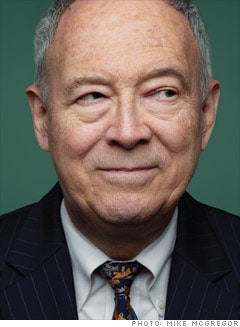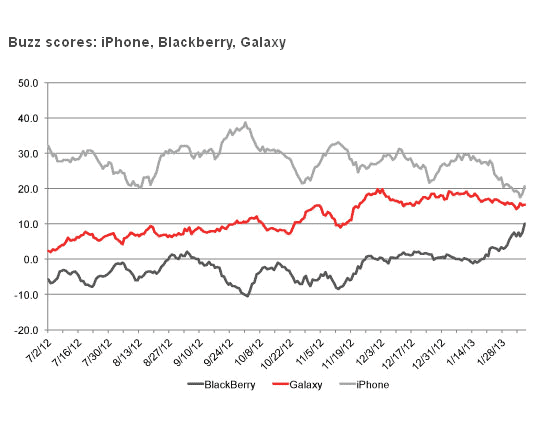Meet the Value Investors who are Buying Research in Motion

In The Intelligent Investor, Ben Graham’s lauded 1949 book that popularized value investing, the author personifies the vagaries of the stock market in the form of a fictional character named “Mr. Market”.
Mr. Market is not a very well-rounded character. In fact, he does little more than show up at a shareholder’s door every day offering to buy or sell shares in a fictional company. The price he offers varies from the wildly crazy to the somewhat plausible. The point of the character is that Graham felt value investors should learn to profit from the irrational behaviour of the stock market, rather than succumb to it.
2011, to a large degree, was a tale of two different entities that shared the name Research in Motion. Research in Motion, the Waterloo-based mobile device giant, grew its revenue from $14.9 billion to $19.9 billion, while increasing earnings per share to $6.34 from $4.53. Research in Motion, the stock, was another story. On the TSX, RIM began 2011 at $58.07 and ended it at $14.80. In between was the botched launch of company’s BlackBerry PlayBook tablet, the delay of its new BlackBerry 10 operating system, and continued loss of market share in mobile devices to both Apple and Android.
On November 3rd, shares of Research in Motion fell below book value for the first time in nine years. Book value, of course, is what you get when you add up a company’s assets, such as cash, real estate and inventories, and subtract its liabilities. At the end of Q2, which ended ended August 27, RIM had a book value of $18.92 a share. Funds such as Janus Capital Management, Brookside Capital Investors, and Greystone Managed Investments bailed. Even George Soros threw in the towel.
_
This story is brought to you by Serenic (TSXV:SER). Serenic’s market cap of $3.18 million (as of January 27th, 2012) was less than its cash position of $4.03 million (as of Q2, 2012). The company has no debt. Click here for more information.
_____
But prior to November, Mr. Market was knocking on the doors of many of North American’s top value investors, and many of them were liking what he had to offer in Research in Motion. One of those men would later play a much larger role in the company, ultimately leading to the ousting of Mike Lazaridis and Jim Balsillie as co-CEOs, and his placement on the company’s board.
In 2010, Prem Watsa held a small position in RIM, but throughout 2011 he aggressively added to it. At last check he owns 5.12% of the company, nearly as much as Balsillie or Lazaridis themselves. Watsa is often referred to as “Canada’s Warren Buffett” and the comparisons do have some grounding in reality. Watsa’s Fairfax Financial, an insurance company with direct investments in other insurance companies and a portfolio of bonds and common stocks, has an average annual return of 17.9% over the past decade. The S&P 500, meanwhile, has returned 1.4% per year in the same period. Fairfax was Canada’s most profitable corporation in 2008, and through moves that sometimes puzzled the general public, Watsa kept making money through the worst recession in a generation. Before the market collapse of 2008, Watsa used credit default swaps to bet against the US credit market. His $341 million bet returned more than $2 billion. Underscoring the Buffett comparison, Watsa even sits on the advisory board of the Ben Graham Centre for Value Investing at Western’s Ivey School of Business.

In the quarter ended June 2011, The Yacktman Fund, an Austin, Texas based mutual-fund that bears the name of its founder, Donald Yacktman, and manages just under $9 billion, opened a new position in RIMM in the June 2011 quarter, with a $71 million purchase. Yacktman, who was voted Portfolio Manager of The Year by Morningstar in 1991, manages the $3.5 billion Yacktman Focused Fund, which has returned 242% over the past decade, and the larger Yacktman Fund, which has returned 213% over the same time frame. As of January 31st, Yacktman held more than 9.6 million shares of RIM.
Late in November, Laszlo Birinyi of Birinyi Associates, a fund that returned nearly 18% in 2011, appeared on CNBC’s Squawk Box to unveil his top five picks for 2012. To the apparent surprise of the Squawk Box hosts, Birinyi was bullish on Research in Motion. He says the company has been beaten down, but has a brand and a loyal devotees. Birinyi recalled that he appeared on the 1997 year-end special of the late Louis Rukheyser’s Wall St. Week, where his top pick was beaten-down Apple Computer, which was trading at $7.
Also in November, hedge-fund manager Leon Cooperman’s Omega Advisors, which manages about (US) $5.5 billion in assets, disclosed that it owned 1.425 million shares of RIM as of September 30th. Three months earlier the fund did not own RIM. After leaving Goldman Sachs, Cooperman started Omega Advisors in 1991. The fund has average an annual return of approximately 16% since.
And John Hussman of Hussman Economtrics Advisors added a million shares of RIM to his holdings this past summer. The fund manager argued that “Unless we are looking at the end of BlackBerrys, Research In Motion, specifically at this price, is worth considering for a value investment.” Hussman had a little money kicking around for a global mobile device maker. Late last year, the fund manager sold his entire position in Apple.
________________________________________________________________________________________________________________________
_________________________________________________________________________________________________________________________
Nick Waddell
Founder of Cantech Letter
Cantech Letter founder and editor Nick Waddell has lived in five Canadian provinces and is proud of his country's often overlooked contributions to the world of science and technology. Waddell takes a regular shift on the Canadian media circuit, making appearances on CTV, CBC and BNN, and contributing to publications such as Canadian Business and Business Insider.


